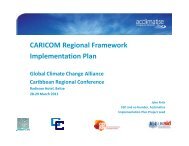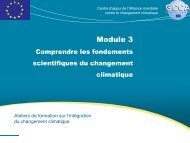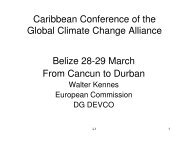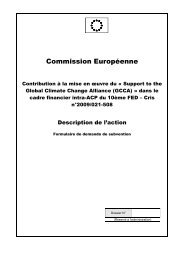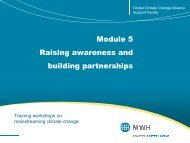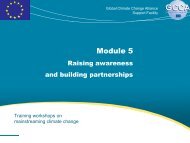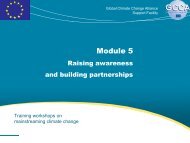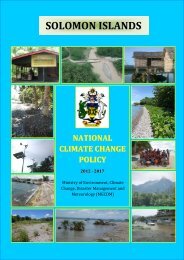Rwanda Green Growth Strategy 18nov11 - Global Climate Change ...
Rwanda Green Growth Strategy 18nov11 - Global Climate Change ...
Rwanda Green Growth Strategy 18nov11 - Global Climate Change ...
You also want an ePaper? Increase the reach of your titles
YUMPU automatically turns print PDFs into web optimized ePapers that Google loves.
Detailed Programmes of ActionProgramme 6: Sustainable Small Scale Energy Installations in RuralAreasResponsible Stakeholders (lead in bold)MININFRA, EWSA, RURA, Private SectorSummary of Programmes and ActionsOff-grid or mini-grid generation potential should be utilised to increase access to electricity in rural areas.This strategy should be seen as pre-electrification and complementary to the grid expansion plans. <strong>Rwanda</strong>will increase development of small scale generation in rural areas by encouraging private sector involvementthrough performance-based grants and incentives for consumer finance; maximising energy projectpotential through high load factors and appropriate maintenance; and building consumer confidencethrough demonstration and product standards. The end goal of these actions is a commercially-viablemodel for rural electrification. Action 1: Private Sector InvolvementPrivate sector involvement can accelerate the diffusion of small scale renewable generation projects intorural areas. <strong>Rwanda</strong> will encourage private sector involvement in a number of ways. Firstly, it will removeimport and VAT taxes on renewable technology components. Secondly, it will set up a grant-per-unit-soldscheme to incentivise private companies to invest in solar products and biogas digesters. Thirdly, in order toovercome the barrier of high up-front costs for consumer, the GoR will encourage credit institutions – banks,microfinance institutions, savings and credit cooperatives (SACCOs) – to extend consumer finance to thosethat want to purchase renewable energy technologies such as solar home systems and biogas digesters.The GoR will encourage lending through either partial loan guarantee, in which it would assume the risk of acertain percentage of clients defaulting, or a grant-per-unit-financed scheme. Lastly, the GoR will extendloan guarantees to buy down the interest rates of loans for renewable energy enterprises, such as microhydro engineering companies, mini-grid operators, and solar and biogas retailers. Alternatively, the new<strong>Climate</strong> and Environment Fund, FONERWA, could extend concessional loans to such enterprises. As minigridand off-grid systems have high capital costs, grants should incentivise or require the use of efficientend-use technologies. Action 2: Maximisation of Energy Project PotentialCurrently, significant generation potential is lost through poor maintenance, or because projects arefinancially unsustainable. For example, to be financially viable, micro hydro projects must operate with a highload factor. To ensure this high load factor, consideration will be given to productive end-uses of the energyduring the planning of future micro hydro programmes. For example, a hydro plant could be developed intandem with an “anchor consumer” such as a mill, school, or tea plantation that will make up the bulk of theload factor. Once the load factor is guaranteed, it will be then possible to consider construction of a minigrid.Productive end-use strategies should therefore be the norm. Night-time use for electricity, such asbattery charging stations uses, will also be considered. Maintenance strategies are crucial to the success ofany energy project. Local technical and managerial capacity will be built, and where a private company isreceiving a grant-per-unit-sold, a portion could be made conditional upon the product working after a certainnumber of years. Action 3: Build Consumer ConfidenceCreating consumer confidence and awareness in renewable energy technologies is essential to promoteuptake, particularly for solar technologies, pico hydro and biogas digesters. Product standards, drawn fromestablished international standards such as those set by the Lighting Africa Initiative, will be implemented toensure quality. In partnership with the private sector and research institutes such as KIST and CITT,thegovernment will hold marketing events to disseminate information about benefits of renewables and thehealth and environmental pitfalls of traditional fuels; and will implement demonstration projects to promoteconsumer awareness and test the suitability of products for specific communities.66Government of <strong>Rwanda</strong>



